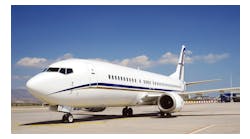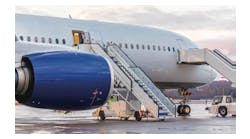ST. PAUL, Minn. — Maplewood-based 3M has turned its aerospace business into a separate division, meaning the business will get more attention and investment as 3M products increasingly show up inside and outside the planes we fly on.
Creating a separate division is a sign that 3M wants to elevate its role with aircraft manufacturers and airline maintenance operations.
"We've really taken our business into looking at 'how can a material science company like 3M play a broader role for the aerospace industry, enabling them to build lighter, safer, quieter aircraft faster,' " said Denise Rutherford, vice president of 3M's Aerospace and Aircraft Maintenance Division.
The company sees lots of opportunity in the sector to increase sales of products for which 3M is well-known — adhesives, sealants and protective films.
For instance, Rutherford said 3M can help make planes lighter by providing low-weight compounds that reinforce lightweight components, making a plane's structure stronger.
"Every 50 to 100 pounds you can take out of an aircraft enables either fuel efficiency or more luggage or another passenger to go into that plane," she said.
3M sound insulation kits make plane cabins quieter for passengers. And the company's films and tapes help prevent corrosion of aircraft frames and protect wings, nose cones and underbellies. Rutherford said corrosion costs the airline industry about $2 billion a year.
3M also offers adhesives and sealants that cure faster, allowing for planes to be built faster.
"These sealants cure between four and maybe six to eight times faster," she said. "Typical sealants ... in the industry take maybe 24 hours to cure. That means the aircraft is stuck in one station in the manufacturing process until those sealants are cured."
Wall Street has reacted positively to 3M's focus on aerospace.
Edward Jones analyst Jeff Windau said 3M is taking a lot of products and technology developed for other industries and applying them to aerospace. "That is the beauty of 3M," he said. "They have so many technologies that go across multiple industries. And they really are able to leverage those effectively."
Windau said 3M's expertise in serving the auto industry, in particular, has been readily transferable to aviation.
"It's a lot about sealants and adhesives and insulation and sound control or acoustics," he said. "A lot of the technologies they developed and used successfully in automotive really translates well from automotive to aerospace."
The aerospace business is part of the company's industrial and transportation business, which does about $10 billion a year in sales. 3M does not break out its aerospace sales. But Morningstar analyst Adam Fleck estimates those sales are between $750 million and $1 billion a year
"It has been growing at a double-digit top line rate for several quarters," he said. "It could be an area that continues drives pretty good growth for 3M. Although aerospace is still a very small piece of the business — in the single digits as a percentage of revenue — it just adds to the breadth of what 3M offers."
3M's aerospace sales grew about 30 percent last year and are soaring this year, too.



